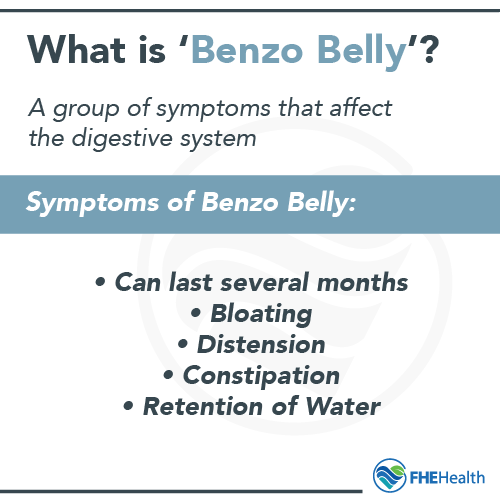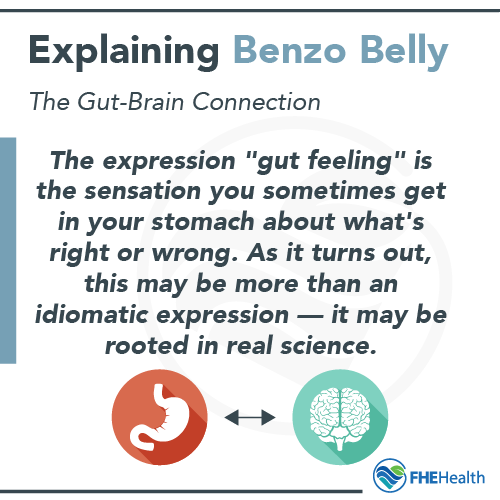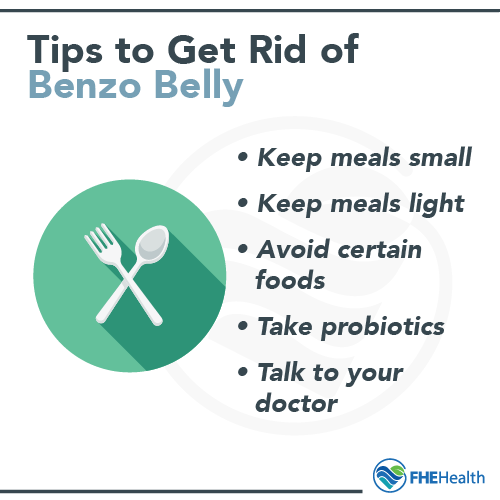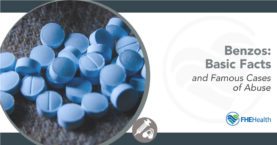
Benzodiazepines — a class of psychotherapeutic drugs used to treat anxiety, depression and other mental health conditions — can quickly cause dependency and addiction, even in users to whom they’re initially prescribed for approved uses.
This leads to a lot of people without any experience with substance abuse suddenly needing addiction treatment. It’s also not uncommon for people addicted to prescription drugs to try to detox on their own. It is rare that these people know what they’re getting into when they start to experience benzo withdrawal, and we’ve been seeing an uptick in complaints of one unexpected withdrawal symptom in particular: bloating, distension and discomfort in the stomach area referred to as “benzo belly.”
In this piece, we explore this specific symptom, including what it is, how it happens, and how to alleviate the symptoms associated with it.
What Is Benzo Belly?
 While benzo detox takes varying amounts of time for different people, there’s typically a few phases: The worst of the symptoms of withdrawal tend to occur between 5 and 19 days after the body is completely free of the influence of the addictive substance.
While benzo detox takes varying amounts of time for different people, there’s typically a few phases: The worst of the symptoms of withdrawal tend to occur between 5 and 19 days after the body is completely free of the influence of the addictive substance.
During this period, it’s common to experience symptoms like muscle pain, headaches, dizziness, mild fever and nausea. But benzo belly pain can last months and months after acute withdrawal is over. It’s slightly less common than other symptoms but still prevalent, and it’s little-understood by both the people experiencing it and the medical community. Why does benzo withdrawal come with extreme — often painful — bloating and distension of the stomach?
For those who experience this condition, it can be frustrating. Many people report that it worsens when they eat or drink anything at all, sometimes to the point that it can restrict or cause pain while breathing. It’s described as similar to the feeling you might have after a big meal — when you’ve eaten so much that it’s physically uncomfortable, except that even the smallest amount of food or beverage can trigger this feeling and the accompanying unsightly physical appearance.
Other symptoms that come with benzo belly include problems with the gastrointestinal tract and constipation, plus there’s a possibility that the condition creates abnormal retention of water, which may cause an associated weight gain.
Understanding the Effects of Benzo Withdrawal
In order to find the source of benzo belly, we first have to reexamine some of the other symptoms of benzo withdrawal. What else could be contributing to this effect?
Over time, abuse of benzos can change your personality and emotional responses to situations. Long-term users can become aggressive and paranoid and suffer from depression. Physical functioning can also be affected, with side effects such as slurred speech and cognitive impairment. Putting a stop to your benzo use will improve your day-to-day life, but the withdrawal process will need to be a slow taper closely monitored by a doctor.
A multitude of complications can arise from the abrupt withdrawal of benzodiazepines, many of which require hospital admission. It’s never a good idea to voluntarily quit prescribed medication without consulting your health care provider, who can help you find the right path forward to wean yourself off powerful prescription drugs.
The only other symptoms of withdrawal from benzodiazepines that involve the GI tract or the nearby organs are nausea and inconsistent breathing. These symptoms are more acute, meaning that benzo belly symptoms can last much longer than these initial side effects, so it doesn’t seem like there’s a strong link between these factors.
Withdrawal Symptoms of Benzodiazepines
Symptoms typically begin between 2 and 24 hours after all medication is stopped. Withdrawal from benzos can include:
- Gastrointestinal problems such as constipation and diarrhea, which can cause long-term issues with your gut microbiome
- Irritable bowel syndrome, abdominal pain and bloating
- Vomiting
- Blurred vision
- Lack of concentration
- Extreme anxiety and depression
- Weight loss
Withdrawal from benzodiazepines will feel physically and psychologically uncomfortable, but it’s rarely lethal. When you’re being weaned off benzos, your health care provider will monitor your symptoms and provide you with a general timeline for recovery. The first few days, known as the acute withdrawal phase, will be the toughest. Anxiety, abdominal distress and insomnia tend to present at the same time, and you’ll want external support from friends and loved ones to make it through.
Possible Scientific Explanations for Benzo Belly Pain
 A few scientific theories seek to explain the link between breaking dependence on these psychiatric drugs and the unique symptoms that affect the gastrointestinal tract, or the gut.
A few scientific theories seek to explain the link between breaking dependence on these psychiatric drugs and the unique symptoms that affect the gastrointestinal tract, or the gut.
The Gut-Brain Connection
A theory that’s becoming more prominent in the scientific community explores the connection between the stomach, the GI tract and the brain. It can be demonstrated through the concept of having a “gut feeling.” This is the sensation you sometimes get in your stomach about what’s right or wrong. As it turns out, this may be more than an idiomatic expression — it may be rooted in real science.
A study published in “The Journal of Clinical Investigation” explores the existence and the effects of something called the gut-brain axis, a system of nerves and reactions that tie these two regions of the body directly together.
Why This Might Explain Benzo Belly
The simplest explanation is this: During benzo withdrawal, there’s chaos going on in your brain. It’s trying to adjust to living without a substance that it has grown accustomed to, and the nerves that control gut function are affected, causing an abnormal reaction to the sudden influence of food or liquid.
Neurotransmitters
There’s another link between the way benzos — and the process of removing them from your system — affect your brain and your gut. In early 2019, a study published in “ScienceDaily” found a correlation between an isolated bacterium in the GI tract and depression, suggesting that there’s a direct link between this region of the body and a person’s mental state.
What’s more, bacteria in the organs of the gut release GABA, which is known to control negative feelings like dread, fear and anxiety. Benzodiazepines work essentially by enhancing the brain’s reception of GABA. This suggests that the presence of benzos can interrupt one degree of the interaction and communication involved in the brain-gut axis, which may have chaotic effects on overall gut function. Additionally, the same bacteria mentioned here are responsible for regulating gas in the GI tract, which may explain the unpredictable bloating that comes with benzo belly.
How Long Does Benzo Belly Last?
The bloating, weight gain and general discomfort associated with benzo belly can be extremely frustrating, especially for people who have overcome withdrawal and are ready to embark on a healthier, sober life without any lasting symptoms. The length of time that the bloating lasts varies in each case. Some people suffer with it for weeks, while others have complained that symptoms of benzo belly have persisted nine months to over a year after acute withdrawal has passed.
Myths About Benzo Belly
There are plenty of myths surrounding benzo withdrawal and the feasibility of home treatments. You should never try to quit benzodiazepines cold turkey, use weed or Adderall to recover or take antidepressants, as all these “remedies” can cause severe harm. Talk to a professional about a plan and get the correct medication for the side effects. An expert should know the timeline of withdrawal and can predict what you’ll need and when.
How Can You Get Rid of Benzo Belly?
 Unfortunately, since the medical community doesn’t have a solid understanding of what causes these symptoms, potential solutions mirror the remedies suggested for many stomach and digestive issues:
Unfortunately, since the medical community doesn’t have a solid understanding of what causes these symptoms, potential solutions mirror the remedies suggested for many stomach and digestive issues:
- Keep meals small: While the symptoms of benzo belly aren’t actually caused by overeating, it’s usually smart not to ask too much of the GI tract.
- Keep meals light: Try to limit heavy foods in your diet. This means consuming liquid foods, smoothies and juices whenever possible and reducing starches and calorie-dense meals.
- Avoid certain foods: Some foods and beverages can be harsh on your stomach, benzo belly or not. You should avoid highly acidic foods.
- Take probiotics: It’s suggested that probiotics replenish the gut bacteria. They can be found in many fermented foods and beverages, as well as in supplement form.
- Talk to your doctor: If you’re in long-term withdrawal from any substance, your primary care physician should be made aware. If the doctor suspects water retention is responsible for your bloated feeling, they may prescribe a diuretic medication.
Keep in mind, these may alleviate the symptoms of bloating but likely won’t completely treat the source of the condition.
Why Medical Detox Is Important for Benzo Withdrawal
Trying to undergo detox on your own is highly unlikely to be successful, and even if you do make it through, a dedicated treatment facility is safer and can potentially make the process more comfortable. Not only do you benefit from constant supervision from clinical staff, you’re ensured a safe, comfortable place to undergo withdrawal from a variety of addictive substances.
It’s true that benzo belly, while common in the population of people in recovery from benzodiazepine use, is little-known and even less understood. It may be a case of riding out the symptoms and waiting for it to get better, but receiving treatment from benzo addiction and recover specialists while in a medical detox program may stabilize your system and decrease the chance that this uncomfortable bloating will be severe, or even occur at all.
Benzo Detox at FHE Health
If you or a loved one is currently struggling with prescription benzo abuse, it’s never a bad time to ask for help. To learn about all your options for recovery services, contact FHE Health today.









